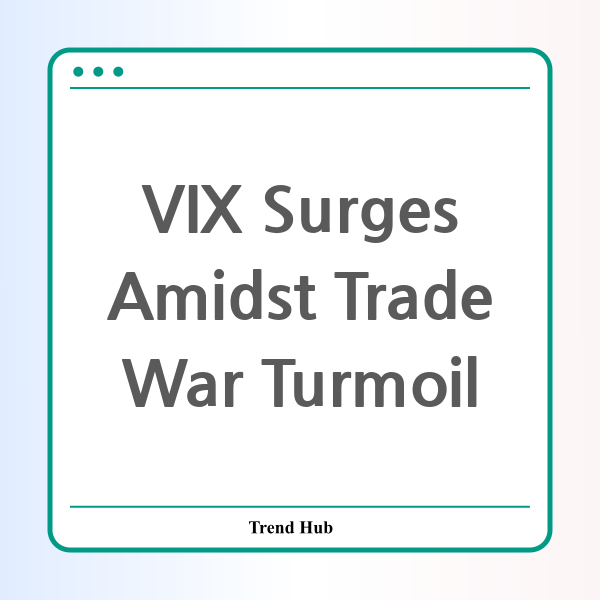* This website participates in the Amazon Affiliate Program and earns from qualifying purchases.

Have you felt the tremors shaking Wall Street lately? Investors everywhere are holding their breath as market volatility hits unprecedented levels, driven by escalating trade tensions. Recently, the Chicago Board Options Exchange's CBOE Volatility Index, commonly referred to as the VIX, surged to its highest peak since August of last year, and it has many traders reeling in fear.
The VIX serves as a barometer for investor sentiment, reflecting market expectations of future volatility in the S&P 500 index options. When this index spikes, it signals that traders are expecting turbulence, leading to a sell-off that can unsettle markets. The latest data shows that the VIX climbed above 40 on Friday, a startling rise of 116% since the beginning of the year. What does this mean for the average investor? Simply put, panic has set in.
The chaos in the markets can be traced back to President Trump's recent announcement of a new tariff package that rattled investors. As retaliatory tariffs were swiftly implemented by China, the global trade war ignited fears of a significant downturn in the economy. This uncertainty contributed to a drop in major indexes, with the S&P 500 down approximately 11% year-to-date. Such declines have left many investors wary, as evidenced by a survey conducted by the American Association of Individual Investors. The findings indicated that 61.9% of respondents are bearish on the stock market over the next six months—nearly double the typical proportion of pessimistic investors.
What does all this mean for your investment strategy? For many, the current market conditions might seem daunting. Investors have witnessed over $31 billion in outflows from US equities in just two weeks amid this turmoil. If you're feeling anxious about your investments, you're certainly not alone. Heightened volatility often leads to uncertainty, and in times like these, emotions can cloud rational decision-making.
So, how should you navigate these choppy waters? Here are some key strategies to consider:
- Diversify Your Portfolio: Ensure you’re not overly concentrated in a single sector or asset class. Diversification can help mitigate risks.
- Stay Informed: Keep a close eye on market trends and economic indicators that could signal further change.
- Avoid Panic Selling: When fear takes over, it can be tempting to sell at a loss. Focus on your long-term investment strategy rather than knee-jerk reactions.
As we move forward, it’s essential to remember that market fluctuations are a natural part of investing. While the current surge in the VIX indicates heightened uncertainty, it also presents opportunities for strategic investors who can remain calm amid the chaos. In the face of this trade war, staying level-headed and informed will be your best assets.
In conclusion, while the spike in the VIX serves as a warning sign of increased market volatility, it also emphasizes the importance of understanding your investment strategy. As you assess your portfolio, keep in mind that with every challenge lies an opportunity, and navigating through these turbulent times requires a steady hand and a clear mind.
* This website participates in the Amazon Affiliate Program and earns from qualifying purchases.